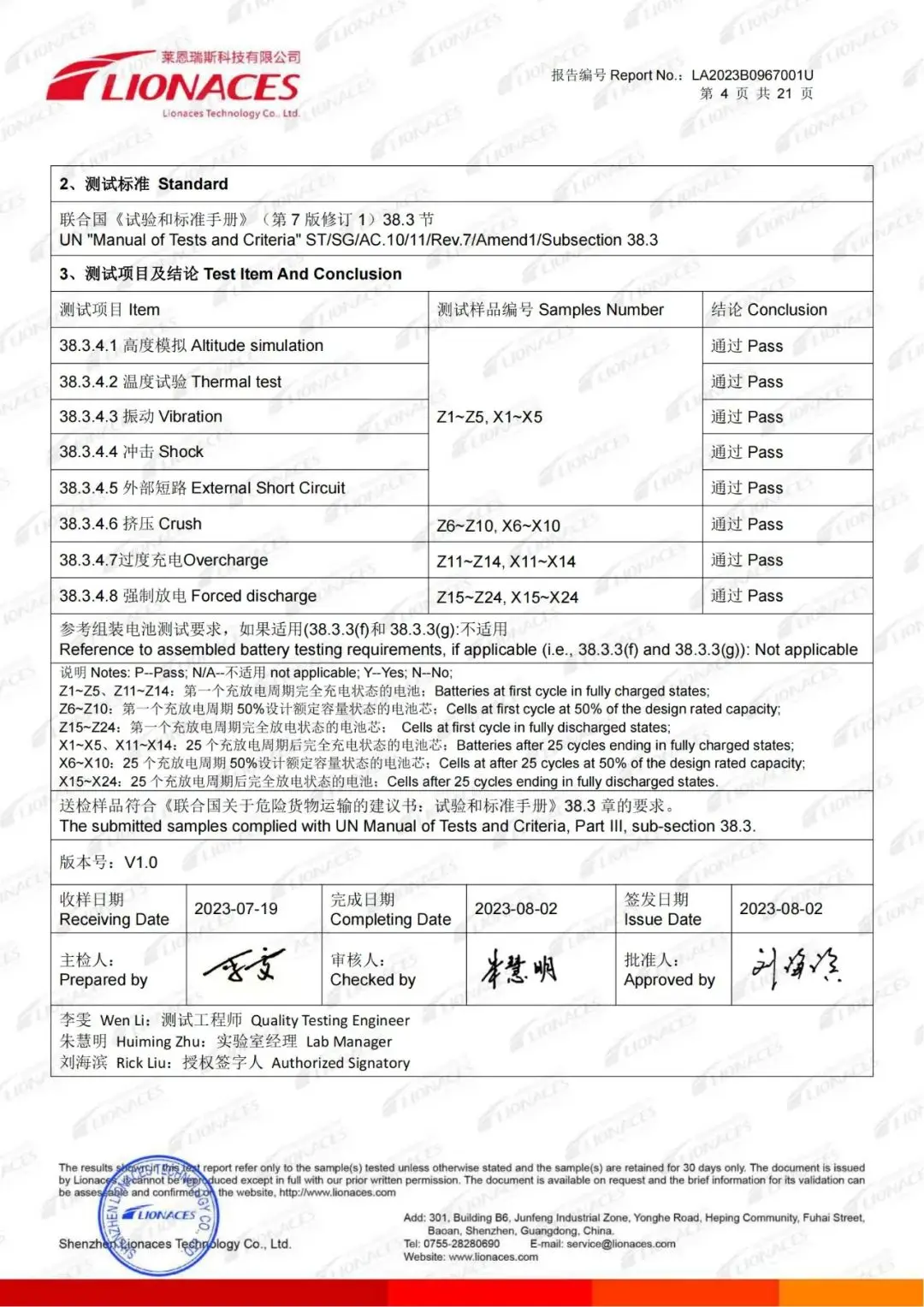
What is a UN38.3 test report? How much does it cost?
What is a un38.8 test report?
un38.3 refers to Section 38.3 of the "Manual of Tests and Criteria" in the United Nations regULations for the transportation of dangerous goods. It requires that lithium batteries must pass a series of tests before transportation, including altitude simulation, temperature cycling, vibration, shock, 55°C short-circuit, impact, overcharge, and forced discharge tests to ensure transportation safety. If the lithium batteries are not installed in equipment and each package contains more than 24 battery cells or 12 batteries, a 1.2-meter drop test is also requiRED.
How much does a un38.3 test report cost?
It costs around $300 to $930. The price decreases as the number of tests increases. The above is the quote from JJR Laboratory in China. For specific inquiries, you can send your product specifications to JJR engineers. The un38.3 test report can also be provided by third-party testing agencies designated by civil aviation or battery manufacturers with testing capabilities.
If the UN38.3 safety test report cannot be provided, airlines will prohibit the air transportation of lithium batteries. This is to ensure the safety of the aircraft and passengers, making the un38.3 certification testing project report very necessary and meaningful.

What materials are needed for UN38.3 lithium battery certification testing?
1. Contact JJR engineers to obtain and fill out the application form.
2. Provide a letter of authorization, lithium battery transportation declaration, and accompanying documents.
3. Battery specifications.
4. Packaging images (images of the outer packaging, opened outer packaging, and inner packaging).
5. Test samples (need two products with parameters such as capacity, watt-hour, voltage, etc., printed on them).
6. Battery cell specifications.
Currently, airlines, according to the International Air Transport Association (IATA) Dangerous Goods Regulations, have established testing requirements for rechargeable lithium batteries in products such as mobile phone batteries, laptop batteries, walkie-talkie batteries, camera batteries, and remote-controlled toy batteries. For products containing lithium batteries, the testing requirement is Section 38.3 of the "Manual of Tests and Criteria" (hereinafter referred to as UN38.3 testing).
UN38.3 battery packaging requirements:
1. Unless installed in equipment (e.g., mobile phones, cameras, walkie-talkies, laptops), batteries and spare batteries must be individually packaged to prevent short circuits and enclosed in a sturdy outer packaging.
2. Unless installed in equipment, if each package contains more than 24 spare batteries or 12 batteries, the following requirements must also be met:
1) Each package must be labeled to indicate that it contains lithium batteries and specify the special measures to be taken in case of package damage.
2) Each shipment must have accompanying documents to indicate that the package contains lithium batteries and specify the special measures to be taken in case of package damage.
3) Each package must withstand a 1.2-meter drop test from any orientation without damaging the batteries or spare batteries inside, and without causing any movement that could result in contact between the batteries (or spare batteries) or leakage from the package.
4) If the batteries are transported individually, the gross weight of each package must not exceed 10 kg.
Email:hello@jjrlab.com
Write your message here and send it to us
 IEC 62471 Photobiological Safety of Lamps and Lamp
IEC 62471 Photobiological Safety of Lamps and Lamp
 New European Toy Standard EN 71-1:2026
New European Toy Standard EN 71-1:2026
 EN71 Series Standards Compliance February 13, 2026
EN71 Series Standards Compliance February 13, 2026
 European Toy Safety Standard EN 71-20:2025
European Toy Safety Standard EN 71-20:2025
 EN 18031 Certification for Connected Devices on Am
EN 18031 Certification for Connected Devices on Am
 Compliance Guide for Portable Batteries on Amazon
Compliance Guide for Portable Batteries on Amazon
 2026 EU SVHC Candidate List (253 Substances)
2026 EU SVHC Candidate List (253 Substances)
 LFGB Certification Cost and Timeline Guide
LFGB Certification Cost and Timeline Guide
Leave us a message
24-hour online customer service at any time to respond, so that you worry!




